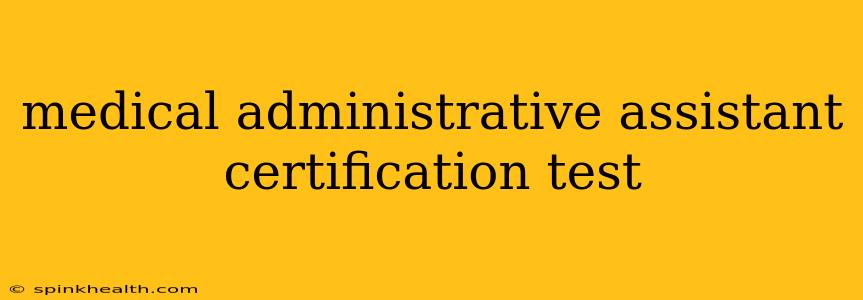The path to becoming a certified Medical Administrative Assistant (MAA) is paved with dedication, hard work, and a thorough understanding of the field. This journey culminates in the certification exam—a pivotal moment that can launch your career. This isn't just a test; it's a testament to your skills and readiness to handle the dynamic world of medical administration. Let's explore this journey together, tackling the challenges and celebrating the successes.
What is the Medical Administrative Assistant Certification Test?
The specific name and content of the Medical Administrative Assistant certification test varies depending on the certifying organization. Some popular certifying bodies include the American Association of Medical Assistants (AAMA) and the National Healthcareer Association (NHA). These organizations offer different exams, each designed to assess a candidate's knowledge and skills in various areas crucial to successful medical office administration. These areas typically include medical terminology, insurance processing, scheduling, billing, electronic health records (EHRs), and patient communication. The tests are designed to ensure you possess the necessary skills to excel in a real-world medical setting.
What topics are typically covered on the MAA certification exam?
The MAA certification exam covers a broad range of topics crucial to effective medical office administration. Expect questions across many areas; preparing for these requires thorough study and practice.
Medical Terminology and Anatomy:
This section tests your understanding of medical terms, abbreviations, and basic anatomy. You'll need to be comfortable deciphering medical jargon, identifying common medical conditions, and understanding anatomical structures. Think of it as the language of the medical world—fluency is key.
Medical Insurance and Billing:
This is often a substantial portion of the exam. You'll be assessed on your knowledge of different insurance plans (Medicare, Medicaid, private insurance), claims processing, coding (CPT, ICD), billing procedures, and handling patient payments. Mastering this section requires a deep understanding of the intricacies of healthcare finance.
Scheduling and Appointment Management:
Efficient scheduling is the backbone of a well-run medical office. You'll be tested on your ability to manage appointments, handle patient inquiries, reschedule appointments, and maintain accurate patient records. Think of this as the logistical heart of the medical practice.
Electronic Health Records (EHRs):
With the increasing digitization of healthcare, proficiency in EHR systems is essential. The exam will test your knowledge of using EHR software, managing patient data, ensuring data integrity, and complying with HIPAA regulations. This section is critical in today's digital healthcare landscape.
Patient Communication and Customer Service:
Excellent communication skills are paramount in medical administration. This section assesses your ability to interact effectively with patients, answer their questions, handle complaints, and maintain a professional demeanor in all situations. Remember, you are often the first point of contact, representing the medical practice.
Medical Office Procedures and Practices:
This section covers a wider range of administrative tasks, including maintaining medical records, managing supplies, handling correspondence, complying with office policies and procedures, and understanding HIPAA regulations. It's the operational aspect of keeping the office running smoothly.
How can I prepare for the Medical Administrative Assistant Certification Test?
Preparation is key. Don't underestimate the importance of thorough study. Here are some valuable strategies:
-
Enroll in a Certified Medical Administrative Assistant Program: Formal training provides a structured curriculum covering all essential topics. Reputable programs often include practice exams and resources to boost your confidence.
-
Utilize Study Guides and Practice Tests: Numerous study guides and practice tests are available, simulating the actual exam environment. These are invaluable tools for identifying weak areas and honing your skills.
-
Review Medical Terminology and Anatomy: Invest considerable time mastering medical terminology and anatomy. Flashcards, online resources, and medical terminology books are all excellent aids.
-
Practice with Medical Insurance and Billing: Work through practice cases, understanding the various billing codes and insurance claim processes. This will solidify your understanding of medical billing procedures.
-
Familiarize Yourself with EHR Systems: Gain hands-on experience with commonly used EHR software. Many online resources and tutorials offer training and practice.
-
Develop Strong Communication Skills: Role-playing and practicing communication scenarios will enhance your ability to handle various patient interactions.
What are the benefits of getting certified?
Certification showcases your competence and professionalism, opening doors to various career opportunities. It enhances your credibility, strengthens your resume, and improves your earning potential. In a competitive job market, certification makes you stand out.
What if I fail the test?
Don't be discouraged if you don't pass on your first attempt. Many individuals take multiple tries before succeeding. Review your weak areas, study more thoroughly, and try again. Persistence is key.
The medical administrative assistant certification test is a significant step toward a fulfilling career. With dedication, planning, and the right resources, you can conquer the exam and embark on a rewarding journey in the healthcare field. Remember, success is not just about passing the test; it's about developing the skills to excel as a vital member of a healthcare team.

